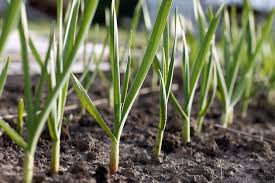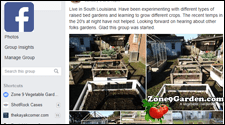Garlic is one of the most popular and tasty vegetables that can be grown in the home garden. It is used in many dishes, and it is also easy to grow in most climates. Unfortunately, Zone 9 is not the easiest climate to grow garlic in.
Most types of garlic require long periods of cold weather to grow properly, but there are a few that grow very well in Zone 9 if you take the proper precautions.
Galic Selection
There are 2 main types of garlic grown in the home garden. Hard neck and Soft neck.
Hard neck Garlic
o Very cold hardy, grows best in colder climates
o Very strong flavor
o Does not store very well
Soft neck Garlic
o Moderately cold hardy, grows best in moderate climates
o A milder flavor
o The best type of garlic for long term storage
As you can see, soft neck garlic is the best for growing in more mild to warmer climates. There are even some garlics that grow very well in zone 9. Our favorite is from Country Creek Acres and is a California Soft neck (this is an Amazon Affiliate link)
VERY IMPORTANT NOTE
Do not pick garlic from the grocery store to grow in your garden. While it MIGHT work, there is a good chance that it will not be the correct type, will not acclimate to the climate you are growing in and will just never produce a good bulb. Always select seed garlic from a reputable dealer, that way you will know for sure that it can grow in your garden.
Prep for Growing Garlic
For garlic to grow its best, the seed garlic should be stored in cold temperatures for 5-8 weeks. This process is called vernalization and will encourage the gallic to grow stronger and produce larger bulbs.
In Zone 9 the best time to sow garlic is from Nov-Dec but can be sown any as late as February, so the vernalization process should be back time to work in that planting window of time.
Location
Garlic prefers 6-8 hours of sun with a well-drained soil. Make sure to select an area that has not had onions or garlic grown in that area for the past year or two (this will help reduce disease and nutrient depletion)
Soil Prep
One of the best methods of soil prep for Garlic is to mix a large amount of compost into the soil a week before sowing. Addition of a high quality fertilizer that has a slight bias to nitrogen at the same time will help the plant get a good early start.
Sowing the Garlic
Before sowing garlic cloves into the soil, make sure to sperate each clove from the bulb. It is best to use the largest cloves (while the small ones will germinate and grow just fine, the larger ones tend to lead to larger cloves at harvest time).
After separating and selecting the cloves to be sown, they should be planted in the soil blunt end down, pointed end up. Push the cloves in until the sharp end is just below the surface.
Garlic likes to be planted about 3-4” apart in rows that are separated by 10-12”.
Growing Garlic
Garlic is a slow growing crop. It is normally started in the early – mid winter and harvested in fall. While it may take a while to grow to full maturity it is fairly undemanding in care
While in the growth phase the only thing garlic will require is frequent watering and cositant fertizliation.
Garlic is a heavy feeder so it will need a fair amount of fertilization, but for most of the growth phase a well balanced (10-10-10) fertilizer will work perfectly.
Stop Adding Nitrogen
Around mid-summer it is time to stop adding nitrogen. Nitrogen is the primary nutrient in leaf growth and at this point it is time for garlic to focus on bulb growth and not leaf growth.
Harvest
Garlic is most frequently harvested in the fall. The easiest way to determine if garlic is ready to be harvested is the leaves. Once mature and ready for harvest, garlic leaves will start to yellow and droop.
When harvesting, do not brush dirt off the bulb, that could harm the papery outside of the clove. Only shake off the loose dirt, the rest will be taken off after curing.
Once the plants are 3-4 yellow leaves check clove development on one plant. If the growth is sufficient, harvest the plants.
Curing and Storage
On the day of harvest if it is a sunny day with no rain predicted, let the garlic sit outside for the day to start the drying and curing process (if not, just move to the next step).
Move the garlic to a cool, dry well-ventilated area (a basement, or garden shed work well). Place the garlic roots facing on drying racks.
Allow the garlic to stay like this for at least 4 weeks. Once all leaves are dried down to within an inch of the bulb the leaves and roots can be removed, the bulbs can be cleaned and moved to storage.
A cool dark area will work perfectly for storing soft neck garlic for 5-7 months. For longer storage garlic does freeze very well.
Selecting Garlic for Seed
For next years crop select the largest bulbs that are harvested. These will lead to larger crops next season as well. Expect about 10-12 useable cloves per large bulb and select the number of bulbs based on that.



